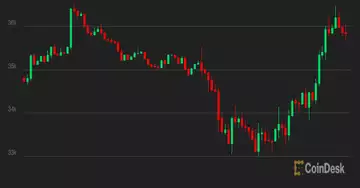Cryptocurrencies are starting to stabilize after falling sharply last week. Some indicators show that investor sentiment is extremely bearish, which usually follows a period of buying activity. However, other technical indicators suggest that choppy price action may continue in the short term.
Bitcoin rose back above $35,000 in the last 24 hours, gaining 3%, while SOL fell 5% and ETH remained about the same over the same period.
Still, it may be too early to call a price bottom. "I think the determination of a bull/bear market is not as clear as previous cycles as the structure of the market has changed drastically with institutions entering the space," Marcus Sotiriou, an analyst at U.K.-based digital asset broker GlobalBlock, wrote in an email to CoinDesk.
"Now it is apparent that Bitcoin is in a range between $29,000 and $69,000 rather than a trend," Sotiriou wrote.
"Bitcoin's rally is far-fetched as investors are more interested in the price stabilizing for now," Alex Axelrod, founder and CEO of Aximetria, a crypto financial services provider, wrote in an email to CoinDesk. Axelrod is watching the BTC price between $32,000 and $40,000 for confirmation of a breakdown or breakout.
Current prices
●Bitcoin (BTC): $36925, +4.41%.
●Ether (ETH): $2448, +0.88%
●S&P 500 daily close: $4410, +0.28%
●Gold: $1842 per troy ounce, +0.56%
●Ten-year Treasury yield daily close: 1.74%.
Bitcoin, ether, and gold prices will be determined at approximately 4 p.m. New York time. Bitcoin is the CoinDesk Bitcoin Price Index (XBX); Ether is the CoinDesk Ether Price Index (ETX); Gold is the COMEX spot price. Information on the CoinDesk indices can be found at coindesk.com/indices.
The chart below shows the recent increase in bitcoin spot trading volume. Short-term traders have been active despite uncertainty about future price trends.
Short-term holders underwater
According to the blockchain data, losses are adding up for most short-term bitcoin holders.
The chart below shows that 18% of short-term Bitcoin holders are losing money (BTC is trading below its average cost basis), which could indicate further selling. A similar scenario occurred during the 2018 bear market and subsequent price corrections.
Long-term bitcoin holders, however, seem unfazed by the recent price decline. "The share of long-term holders has returned to a modest uptrend, suggesting that this cohort is generally unwilling to divest," Glassnode, a crypto data firm, wrote in a blog post Monday.
Crypto funds attract fresh capital
The inflows into crypto funds last week - after five consecutive weeks of outflows - suggest investors were taking advantage of the price drop.
Cryptocurrency funds brought in $14.4 million in new investor money in the seven days through Friday, ending a streak of five consecutive weeks of outflows, according to a report Monday from digital asset manager CoinShares.
Last week's inflows were led by bitcoin-focused funds, which brought in $13.8 million. Ethereum funds, on the other hand, saw outflows of $15.6 million. Read more here.
Altcoin Overview
- Solana slips 17% and leads crypto market losses: Major cryptocurrencies fell as much as 17% in 24 hours as the crypto market followed a broader decline in U.S. stock index futures on Monday. Last Friday, traders complained about the congestion on Solana's network and questioned its ability to attract real capital in this kind of collapse. Solana is attractive to large trading firms in part because it relies on economies of scale. Still, it has been shown that the network can falter when overloaded. Read more here.
- Luxor is trying to get proof-of-work mechanism on Ethereum: Crypto software and services company Luxor is launching an Ethereum mining pool, despite plans to eliminate mining on its network. The company is working with large institutional miners, including Hut 8, and several retail miners in North America to provide a U.S.-based Ethereum mining pool, the company said in a statement Monday, according to Aoyon Ashraf. Read more here.
- OpenSea bug allows attackers to get massive discounts on popular NFTs: A bug on non-fungible token (NFT) marketplace OpenSea has enabled at least three attackers to secure massive discounts on several NFTs and make a huge profit. The flaw, which was discovered back on Dec. 31, allowed the attackers to buy NFTs at older, lower prices and sell them for a hefty profit, according to Eliza Gkritsi. Read more here.
Relevant News
- Coinbase brings on SEC lawyer Thaya Knight to lead public policy team
- Bank of America says US CBDC would preserve dollar's status as world reserve currency
- Chinese government rejects Metaverse trademark applications: Report
- Singapore VC Blockchain Founders raises $75 million for new fund
Other markets
Most digital assets in the CoinDesk 20 ended the day lower.
Biggest gainers:
| Asset | Ticker | Returns | Sector |
|---|---|---|---|
| Cosmos | ATOM | +17.5% | Smart contracts platform |
| Stellar | XLM | +10.9% | Platform for smart contracts |
| Litecoin | LTC | +9.8% | Currency |
Biggest Losers:
| Asset | Ticker | Earnings | Sector |
|---|---|---|---|
| Solana | SOL | -3.0% | Smart contracts platform |
| Filecoin | FIL | -1.5% | Data processing |
| Polygon | MATIC | -1.2% | Smart contracts platform |
Sector classifications are provided through the Digital Asset Classification Standard (DACS), developed by CoinDesk Indices to provide a reliable, comprehensive and standardized classification system for digital assets. The CoinDesk 20 is a ranking of the largest digital assets by volume on trusted exchanges.

